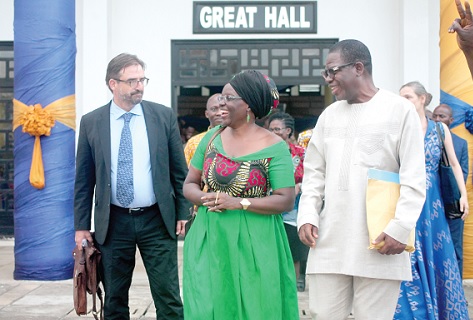
Pan-African approach necessary to improve continent’s economy - Prof. Sylvia Tamale
A Ugandan Law lecturer, Professor Sylvia Tamale, has called for an integrated Pan-African approach to drive the continent’s economy out of its current challenges.
The academic and human rights activist said unless a radical approach was adopted, the neo-liberal strategies embedded in Africa’s economy would further sink the continent and make it remain under-developed for a long period.
Advertisement
Speaking at the second edition of the Anton Wilhelm Amo Lecture at the University of Ghana, Legon, Accra, Prof. Tamale, who is also a former Dean of the Law Faculty of the Makerere University, Uganda, mentioned some of the neo-liberal strategies impacting negatively on Africa’s economy as structural adjustment, poverty reduction policies and wealth-creation programmes.
“A successful de-colonial link from the colonial development modernising models will only be achieved through a Pan-African-led radical movement.
“Africa can learn from the Latin American experience and revert to its indigenous ways of becoming human beings and stop obsessing about material improvements to really understand that you cannot have a good life if people around you are not living well,” she added.
Lecture
The lecture series seek to promote the dissemination of the ideas of Anton Wilhelm Amo, a Ghanaian-German philosopher and lecturer, and also enquire into what it means to be an African in European society.
The topic for this year’s lecture was: “Decolonising knowledge production in Africa.”
It was chaired by the Director of the Institute of African Studies (IAS), University of Ghana, Prof. Samuel Ntewusu.
Among the dignitaries present was the German Ambassador to Ghana, Daniel Krull.
The lecture series are an initiative of the Merian Institute for Advanced Studies in Africa (MIASA), in collaboration with the IAS and the Department of Philosophy and Classics of the University of Ghana.
They are named after the 18th century philosopher from present-day Ghana who taught at the universities of Halle and Jena in Germany.
Education
Prof. Tamale further said Africa needed an educational system that tested indigenous knowledge embedded with its context.
She said those who controlled language controlled reality, and for that reason there was the need to teach the younger generation in their respective local dialects.
“We must heed to calls of African scholars to re-centre indigenous ways of knowing and de-colonise methodologies derived from oral traditions.
“As the epicentre of colonial indoctrination, the African university needs to be reinvented as a subversive, anti-imperialist, anti-sexist, anti-capitalist and non-elitist space,” she added.
Situation
The Director of the IAS, Prof. Ntewusu, said the characteristic features of the colonial narrative of Africa's past were still found in writings and verbal expressions.
He said new generations were exposed to the wrongful use of terms such as ‘tribe’ and ‘paganism’, including technological inventions and innovations in African knowledge systems.
He said such major misapprehensions originally served the purpose of colonialism rather than science.
“De-colonialism in Africa is not a topic of interest to me, as the chair in this hall alone, but individuals, institutions, inter-governmental entities, students and the private sector in general,” he said.
Partnership
For his part, the German Ambassador said Ghana was a significant partner of Germany, referring to the economic development cooperation between the two countries.
He said the Ghana Beyond Aid Agenda could become feasible with further collaborations in areas such as science and research, adding that his country was ready to offer the necessary support.
“Ghana has become an important regional network in advancing scientific cooperation,” Mr Krull said.



